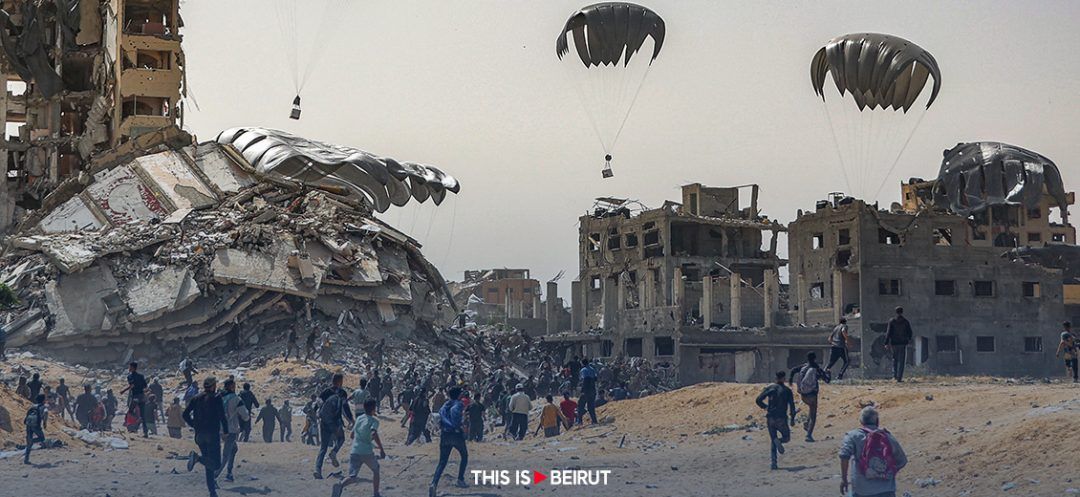- Home
- War in the Middle East
- Gaza War Enters 200th Day as Rafah Offensive Looms

©(Photo by AFP)
The Israel-Hamas war entered its 200th day on Tuesday, with fears mounting of an Israeli invasion in the overcrowded south of the besieged Gaza Strip amid calls for hostages to be freed.
Shelling and loud explosions were heard in southwest Gaza and the city of Khan Younes in the south, while air strikes struck near the Bureij refugee camp and artillery fire hit the Nuseirat refugee camp.
German Foreign Minister Annalena Baerbock called for the captives' release on Tuesday.
As diplomacy aimed at ending the war stalls, key mediator Qatar said Hamas' political leadership would stay in Doha "as long as their presence here... is useful and positive in this mediation effort," according to foreign ministry spokesperson Majed al-Ansari.
The Gulf state, which has hosted Hamas leaders since 2012, said last week that it was reassessing its mediation role, fueling speculation that the Palestinian group could be asked to leave.
Passover 'Pain'
More than 300 bodies were uncovered of people killed and buried by Israeli forces at the Nasser Hospital in Khan Younes, which Israel has yet to comment on.
The United Nations rights office said it was "horrified" by the destruction at Nasser and Gaza City's Al-Shifa hospital, the territory's two largest medical facilities, which were both previously raided by Israeli forces.
Demanding an "independent" probe, UN rights chief Volker Turk noted the "special protection" awarded to hospitals under international law.
Public pressure has mounted on the government of Israeli Prime Minister Benjamin Netanyahu to strike a deal that would secure the release of the remaining hostages.
At a rally near Netanyahu's home in the coastal town of Caesarea, protesters, including relatives of hostages, set fire to a symbolic table for Passover, also known in Hebrew as the "holiday of freedom."
Looming Rafah Offensive
Global opposition has mounted over the civilian toll of Israel's Gaza offensive, which has turned vast areas into rubble and sparked fears of famine.
The United Nations says that "multiple obstacles" continue to impede the delivery of urgently needed aid for Gazans desperate for food, water, shelter, and medicine.
But Netanyahu has vowed to press on with a planned offensive on Rafah, the town on the border with Egypt, where most of Gaza's 2.4 million population has sheltered.
Citing Egyptian officials briefed on the Israeli plans, the Wall Street Journal said that Israel was planning to move civilians from Rafah to nearby Khan Younes.
The operation would last two to three weeks and be done in coordination with the United States, Egypt, and other Arab countries, including the United Arab Emirates, the Journal reported.
Israel would then send troops into Rafah gradually, targeting areas where Hamas' leaders are thought to be hiding, in a military operation that would last six weeks, it added.
Foreign ministers of the G7 group of developed economies have said they oppose a "full-scale military operation in Rafah" because of the "catastrophic consequences" for civilians, fears shared by many aid groups.
Meanwhile, the US Senate is set to vote today on an aid package for its allies, including Israel, that is expected to land on President Joe Biden's desk by the end of the week.
It earmarks $13 billion for Israel's war with Hamas and more than $9 billion for humanitarian assistance in Gaza, "as well as other vulnerable populations around the world."
Human Toll
About 1,170 Israelis were reported dead, according to an AFP tally of Israeli official figures, since the onset of the war between Israel and Hamas.
In turn, Israel has killed at least 34,183 people in Gaza, mostly women and children, according to the health ministry in the enclave.
About 250 people were abducted during the Hamas attack. Israel estimates that 129 captives remain in Gaza, including 34 who the military says are dead.
with AFP
Shelling and loud explosions were heard in southwest Gaza and the city of Khan Younes in the south, while air strikes struck near the Bureij refugee camp and artillery fire hit the Nuseirat refugee camp.
German Foreign Minister Annalena Baerbock called for the captives' release on Tuesday.
As diplomacy aimed at ending the war stalls, key mediator Qatar said Hamas' political leadership would stay in Doha "as long as their presence here... is useful and positive in this mediation effort," according to foreign ministry spokesperson Majed al-Ansari.
The Gulf state, which has hosted Hamas leaders since 2012, said last week that it was reassessing its mediation role, fueling speculation that the Palestinian group could be asked to leave.
Passover 'Pain'
More than 300 bodies were uncovered of people killed and buried by Israeli forces at the Nasser Hospital in Khan Younes, which Israel has yet to comment on.
The United Nations rights office said it was "horrified" by the destruction at Nasser and Gaza City's Al-Shifa hospital, the territory's two largest medical facilities, which were both previously raided by Israeli forces.
Demanding an "independent" probe, UN rights chief Volker Turk noted the "special protection" awarded to hospitals under international law.
Public pressure has mounted on the government of Israeli Prime Minister Benjamin Netanyahu to strike a deal that would secure the release of the remaining hostages.
At a rally near Netanyahu's home in the coastal town of Caesarea, protesters, including relatives of hostages, set fire to a symbolic table for Passover, also known in Hebrew as the "holiday of freedom."
Looming Rafah Offensive
Global opposition has mounted over the civilian toll of Israel's Gaza offensive, which has turned vast areas into rubble and sparked fears of famine.
The United Nations says that "multiple obstacles" continue to impede the delivery of urgently needed aid for Gazans desperate for food, water, shelter, and medicine.
But Netanyahu has vowed to press on with a planned offensive on Rafah, the town on the border with Egypt, where most of Gaza's 2.4 million population has sheltered.
Citing Egyptian officials briefed on the Israeli plans, the Wall Street Journal said that Israel was planning to move civilians from Rafah to nearby Khan Younes.
The operation would last two to three weeks and be done in coordination with the United States, Egypt, and other Arab countries, including the United Arab Emirates, the Journal reported.
Israel would then send troops into Rafah gradually, targeting areas where Hamas' leaders are thought to be hiding, in a military operation that would last six weeks, it added.
Foreign ministers of the G7 group of developed economies have said they oppose a "full-scale military operation in Rafah" because of the "catastrophic consequences" for civilians, fears shared by many aid groups.
Meanwhile, the US Senate is set to vote today on an aid package for its allies, including Israel, that is expected to land on President Joe Biden's desk by the end of the week.
It earmarks $13 billion for Israel's war with Hamas and more than $9 billion for humanitarian assistance in Gaza, "as well as other vulnerable populations around the world."
Human Toll
About 1,170 Israelis were reported dead, according to an AFP tally of Israeli official figures, since the onset of the war between Israel and Hamas.
In turn, Israel has killed at least 34,183 people in Gaza, mostly women and children, according to the health ministry in the enclave.
About 250 people were abducted during the Hamas attack. Israel estimates that 129 captives remain in Gaza, including 34 who the military says are dead.
with AFP
Read more



Comments